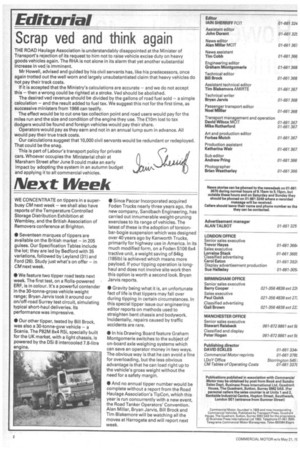Scrap ved and think again
Page 4

If you've noticed an error in this article please click here to report it so we can fix it.
THE ROAD Haulage Association is understandably disappointed at the Minister of Transport's rejection of its request to him not to raise vehicle excise duty on heavy goods vehicles again. The RHA is not alone in its alarm that yet another substantial increase in ved, is imminent.
Mr Howell, advised and guided by his civil servants has, like his predecessors, once again trotted out the well worn and largely unsubstantiated claim that heavy vehicles do not pay their track costs.
If it is accepted that the Ministry's calculations are accurate -and we do not accept this — then a wrong could be righted at a stroke. Ved should be abolished.
The desired ved revenue should be divided by the gallons of road fuel sold — a simple calculation — and the result added to fuel tax. We suggest this not for the first time, as successive ministers from 1966 can testify.
The effect would be to cut one tax collection point and road users would pay for the miles run and the size and condition of the engine they use. The £10m lost to tax dodgers would be found and foreign vehicles would pay their share. Operators would pay as they earn and not in an annual lump sum in advance. All would pay their true track costs.
Our calculations suggest that 10,000 civil servants would be redundant or redeployed. That could be the snag.
This is part of Labour's transport policy for private cars. Whoever occupies the Ministerial chair at Marsham Street after June 9 could make an early impact by adopting the system in an autumn budget and applying it to all commercial vehicles.
























































































































